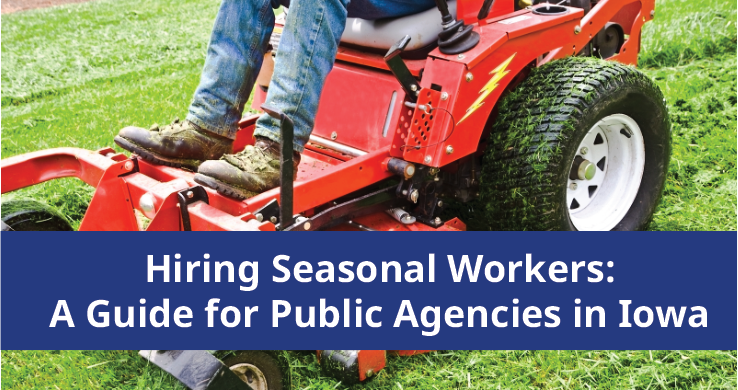
Article provided by: Amanda Trebon Boyd, Iowa League of Cities
As public entities in Iowa gear up for seasonal activities and events, the need for hiring seasonal workers becomes apparent, whether it’s for park maintenance, event staffing, or other seasonal tasks. Many members rely on minors for summer help, particularly in roles such as lifeguards at pools and assistants in parks. Since seasonal workers, especially minors, may only work temporarily, employers sometimes overlook proper orientation and onboarding processes. However, finding the right individuals for these temporary positions is crucial for ensuring smooth operations. It’s essential to recognize that many seasonal workers, especially teenagers, might be starting their first-ever job.
What are the typical seasonal jobs available in Iowa public entities?
Seasonal job opportunities in Iowa public entities vary depending on the specific needs of each municipality. Common positions include park maintenance workers, lifeguards for public pools, event staff for festivals and fairs, groundskeepers for public spaces, and seasonal clerical or administrative roles.
How can public entities attract qualified candidates for seasonal positions?
To attract qualified candidates, Iowa public entities can utilize a variety of recruitment strategies. This includes posting job listings on the city’s websites and social media platforms, as well as local job boards. Collaborating with local schools, colleges, and community organizations can help reach potential applicants. Offering competitive wages, flexible scheduling options, and opportunities for skill development can further enhance the appeal of seasonal positions.
What steps should public entities take to ensure a smooth hiring process for seasonal workers?
To streamline the hiring process, employers should establish clear job descriptions outlining the responsibilities and requirements of each seasonal position. Utilizing online application systems can simplify the application and screening process. Conducting thorough interviews and reference checks helps ensure that candidates are well-suited for the role. Additionally, providing comprehensive training for seasonal workers, especially minors, enables them to perform their duties effectively from day one.
How can public entities effectively manage and support their seasonal workforce?
Effective management and support are essential for maximizing the productivity and satisfaction of seasonal workers. Assigning dedicated supervisors or mentors to oversee seasonal staff can provide guidance and assistance as needed. Encourage an environment where employees feel comfortable asking questions and seeking guidance. Establish communication channels to address any concerns or issues that may arise during the season. Recognizing and appreciating the contributions of seasonal workers through incentives, awards, or simple expressions of gratitude can also foster a positive work environment.
What are some legal considerations Iowa public entities should keep in mind when hiring seasonal workers?
Iowa public entities must adhere to federal and state labor laws when hiring seasonal workers to ensure compliance with minimum wage requirements, workers’ compensation coverage, and a safe working environment. Public entities need to be mindful of specific regulations or ordinances applicable to seasonal employment within their jurisdiction. Consulting with legal counsel or human resources professionals can help ensure compliance with relevant laws and regulations. Employers should adhere to various employment laws, including the Fair Labor Standards Act (FLSA) for minimum wage, overtime, and child labor regulations. Additionally, businesses with 15 or more employees should consider regulations from the Equal Employment Opportunity Commission (EEOC) regarding discrimination and equal pay, while those with over 50 employees must comply with Affordable Care Act (ACA) regulations. Moreover, special attention should be given to Iowa Child Labor Law and Occupational Safety and Health Administration (OSHA) regulations when hiring teenagers.
Are there any special considerations for hiring minors?
The workplace hazards and regulations concerning minors working outdoors are multifaceted. These hazards include but are not limited to heat exposure, landscaping tasks, electricity, heavy lifting, and noise. Employers must recognize these potential dangers and take proactive measures to mitigate risks to young workers. Compliance with specific regulations outlined by the Iowa Child Labor Law and Occupational Safety and Health Administration (OSHA) is paramount. These regulations dictate duties, work hours, and safety protocols to safeguard minor workers. Emphasizing the importance of adhering to proper procedures and utilizing appropriate equipment is essential for ensuring the well-being of young employees in outdoor work environments.
Hiring seasonal workers is a critical aspect of ensuring the smooth operation of public entities across the state. By prioritizing qualities such as reliability, flexibility, and a strong work ethic, public entities can attract and retain qualified candidates for seasonal positions. Establishing clear hiring processes, providing adequate support and training, and complying with legal requirements are essential steps in effectively managing a seasonal workforce. By employing these strategies, Iowa public entities can enhance their seasonal hiring efforts and contribute to the success of seasonal activities and events within their communities. Following these guidelines also ensures the safety of seasonal workers, particularly minors, in the workplace. Proper preparation and adherence to regulations contribute to a successful and fulfilling seasonal employment experience for both employers and employees.
Pharmacy Benefit Management: Maximizing Safety and Savings

Since June 2019, IMWCA has partnered with a pharmacy benefit management vendor. Prodigy RX helps run our pharmacy benefit management (PBM) program. PBMs are companies that manage prescription drug benefits. They do this by negotiating with drug manufacturers and pharmacies. PBMs help determine how much pharmacies are paid, which in turn determines the costs we pay for each prescription as a workers’ compensation carrier.
A PBM is not always about the money. PBMs also provide drug utilization reviews, which provide an important safety element. PBMs will review a drug(s) a particular patient is taking to determine effectiveness, drug interactions, and potential dangers. Since PBMs have access to a patient’s drug history they can alert patients and doctors to negative drug interactions if they were to mix certain medications.
The PBM also looks at if a generic medication could be used. There is also an effort to make sure the patient is taking proper treatment steps, isn’t exceeding the quantity of medication prescribed, and is responding to the medication.





